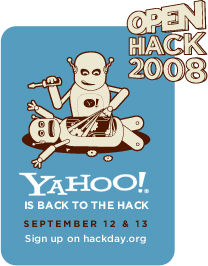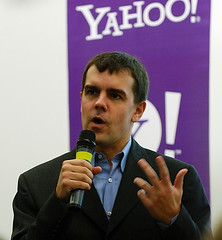I am happy to announce the following ad auctions workshop and solicit submissions and participants.
=======================================================================
Call for Papers
Fourth Workshop on Ad Auctions
http://research.yahoo.com/workshops/ad-auctions-2008/
July 8-9, 2008
Chicago, Illinois, USA
SUBMISSIONS DUE MAY 11, 2008
In conjunction with the
ACM Conference on Electronic Commerce (EC’08)
=======================================================================
We solicit submissions for the Fourth Workshop on Ad Auctions, to be
held July 8-9, 2008 in Chicago in conjunction with the ACM Conference
on Electronic Commerce. The workshop will bring together researchers
and practitioners from academia and industry to discuss the latest
developments in advertisement auctions and exchanges.
In the past decade we’ve seen a rapid trend toward automation in
advertising, not only in how ads are delivered and measured, but also
in how ads are sold. Web search advertising has led the way, selling
space on search results pages for particular queries in continuous,
dynamic “next price” auctions worth billions of dollars annually.
Now auctions and exchanges for all types of online advertising —
including banner and video ads — are commonplace, run by startups and
Internet giants alike. An ecosystem of third party agencies has grown
to help marketers manage their increasingly complex campaigns.
The rapid emergence of new modes for selling and delivering ads is
fertile ground for research from both economic and computational
perspectives. What auction or exchange mechanisms increase advertiser
value or publisher revenue? What user and content attributes
contribute to variation in advertiser value? What constraints on
supply and budget make sense? How should advertisers and publishers
bid? How can both publishers and advertisers incorporate learning and
optimization, including balancing exploration and exploitation? How do
practical constraints like real-time delivery impact design? How is
automation changing the advertising industry? How will ad auctions and
exchanges evolve in the next decade? How should they evolve?
Papers from a rich set of empirical, experimental, and theoretical
perspectives are invited. Topics of interest for the workshop include
but are not limited to:
* Web search advertising (sponsored search)
* Banner advertising
* Ad networks, ad exchanges
* Comparison shopping
* Mechanism and market design for advertising
* Ad targeting and personalization
* Learning, optimization, and explore/exploit tradeoffs in ad placement
* Ranking and placement of ads
* Computational and cognitive constraints
* Game-theoretic analysis of mechanisms, behaviors, and dynamics
* Matching algorithms: exact and inexact match
* Equilibrium characterizations
* Simulations
* Laboratory experiments
* Empirical characterizations
* Advertiser signaling, collusion
* Pay for impression, click, and conversion; conversion tracking
* Campaign optimization; bidding agents; search engine marketing (SEM)
* Local (geographic) advertising
* Contextual advertising (e.g., Google AdSense)
* User satisfaction/defection
* User incentives and rewards
* Affiliate model
* Click fraud detection, measurement, and prevention
* Price time series analysis
* Multiattribute and expressive auctions
* Bidding languages for advertising
We solicit contributions of two types: (1) research contributions,
and (2) position statements. Research contributions should report new
(unpublished) research results or ongoing research. The workshop
proceedings can be considered non-archival, meaning contributors are
free to publish their results later in archival journals or
conferences. Research contributions can be up to ten pages long, in
double-column ACM SIG proceedings format:
http://www.acm.org/sigs/publications/proceedings-templates
Position statements are short descriptions of the authors’ view of how
ad auction research or practice will or should evolve. Position
statements should be no more than five pages long. Panel discussion
proposals and invited speaker suggestions are also welcome.
The workshop will include a significant portion of invited
presentations along with presentations on accepted research
contributions. There will be time for both organized and open
discussion. Registration will be open to all EC’08 attendees.
The first three workshops on sponsored search auctions successfully
attracted a wide audience from academia and industry working on
various aspects of web search advertising. Following the footsteps of
the previous workshops, the Fourth Workshop on Ad Auctions strives to
be a venue that helps address challenges in the broader field of
online advertising, by providing opportunities for researchers and
practitioners to interact with each other, stake out positions, and
present their latest research findings. While the first three
workshops focused on web search advertising, we have broadened the
scope this year to include auctions and exchanges for any form of
online advertising.
Submission Instructions
=======================
Research contributions should report new (unpublished) research
results or ongoing research. The workshop’s proceedings can be
considered non-archival, meaning contributors are free to publish
their results later in archival journals or conferences. Research
contributions can be up to ten pages long, in double-column ACM SIG
proceedings format:
http://www.acm.org/sigs/publications/proceedings-templates
Positions papers and panel discussion proposals are also welcome.
Papers should be submitted electronically using the conference
management system:
http://www.easychair.org/conferences/?conf=adauctions2008
no later than midnight Hawaii time, May 11, 2008. Authors should also
email the organizing committee ( adauctions2008@yahoogroups.com ) to
indicate that they have submitted a paper to the system.
At least one author of each accepted paper will be expected to attend
and present their findings at the workshop.
Important Dates
===============
May 11, 2008 Submissions due midnight Hawaii time
a. Submit to:
http://www.easychair.org/conferences/?conf=adauctions2008
b. Notify adauctions2008@yahoogroups.com
May 23, 2008 Notification of accepted papers
June 8, 2008 Final copy due
Organizing Committee
====================
Susan Athey, Harvard University
Rica Gonen, Yahoo!
Jason Hartline, Northwestern University
Aranyak Mehta, Google
David Pennock, Yahoo!
Siva Viswanathan, University of Maryland
Program Committee
=================
Gagan Aggarwal, Google
Animesh Animesh, McGill University
Moshe Babaioff, Microsoft
Tilman Borgers, University of Michigan
Max Chickering, Microsoft
Chris Dellarocas, University of Maryland
Ben Edelman, Harvard University
Jon Feldman, Google
Jane Feng, University of Florida
Slava Galperin, A9
Anindya Ghose, New York University
Kartik Hosanagar, University of Pennsylvania
Kamal Jain, Microsoft
Jim Jansen, University of Pennsylvainia
Sebastien Lahaie, Yahoo!
John O. Ledyard, Caltech
Ying Li, Microsoft
Ilya Lipkind, A9
Preston McAfee, Yahoo!
Chris Meek, Microsoft
John Morgan, University of California Berkeley
Michael Ostrovsky, Stanford University
Abhishek Pani, Efficient Frontier
Martin Pesendorfer, London School of Economics
David Reiley, Yahoo!
Tim Roughgarden, Stanford University
Catherine Tucker, Massachusetts Institute of Technology
Rakesh Vohra, Northwestern University
More Information
================
For more information or questions, visit the workshop website:
http://research.yahoo.com/workshops/ad-auctions-2008/
or email the organizing committee:
adauctions2008@yahoogroups.com
 As Jed points out, “an idea is only the first step in innovation, and it’s by far the easiest step”.
As Jed points out, “an idea is only the first step in innovation, and it’s by far the easiest step”.
